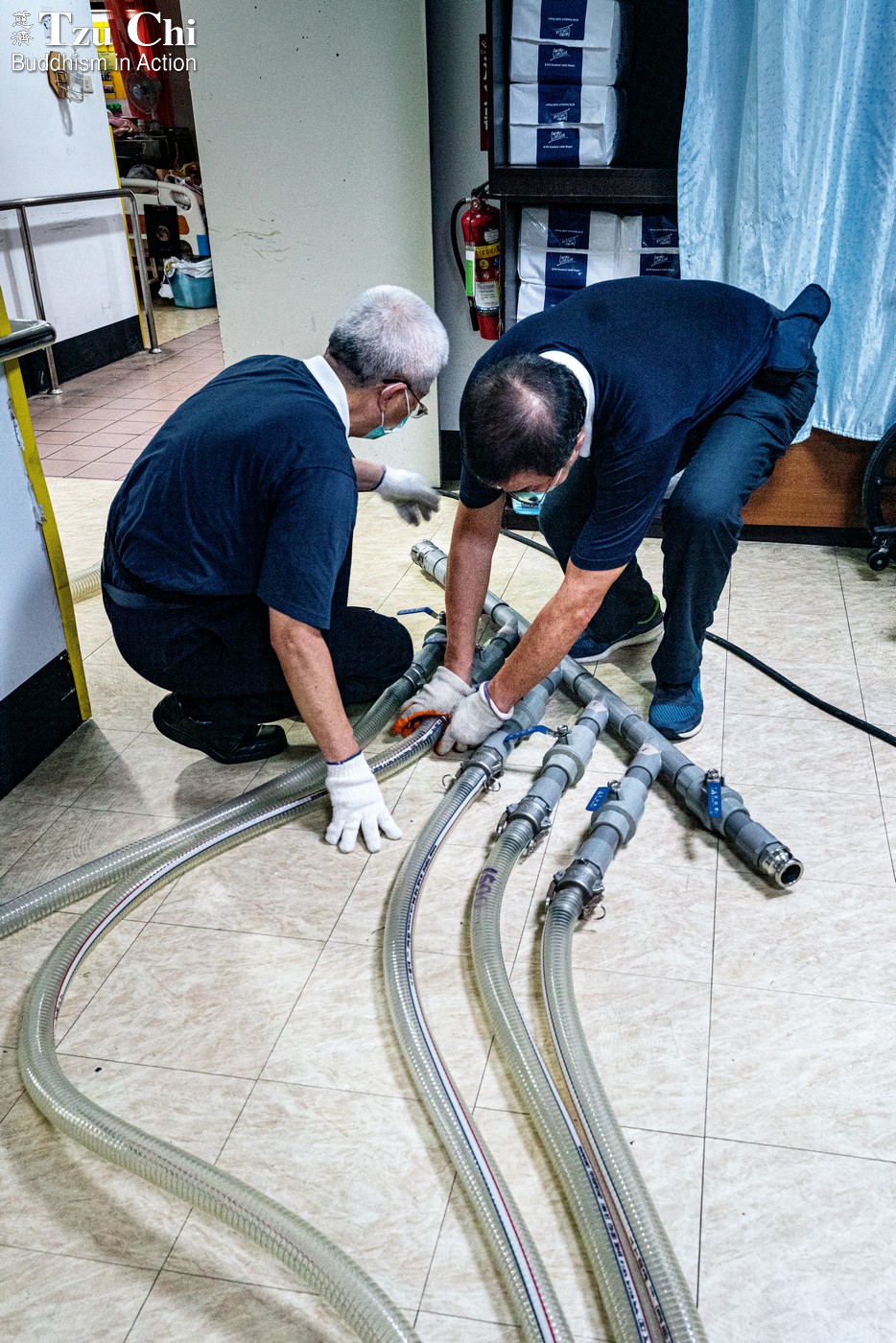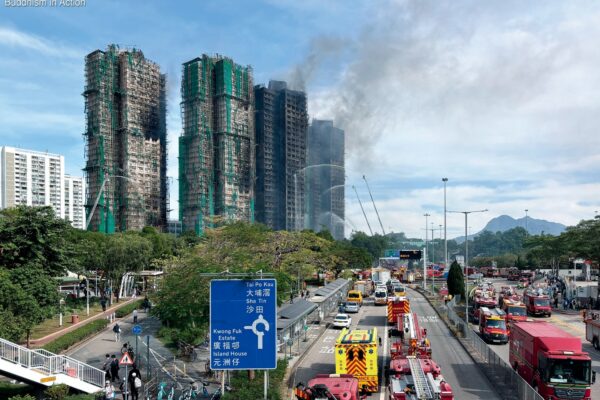By Hong Jing-jing
Translated by Wu Hsiao-ting
Photos by Hsiao Yiu-hwa
Volunteers from all over Taiwan visit three nursing institutions in Taitung twice a year to provide dental care to people with special needs, addressing the difficulties these individuals face in seeking medical treatment.
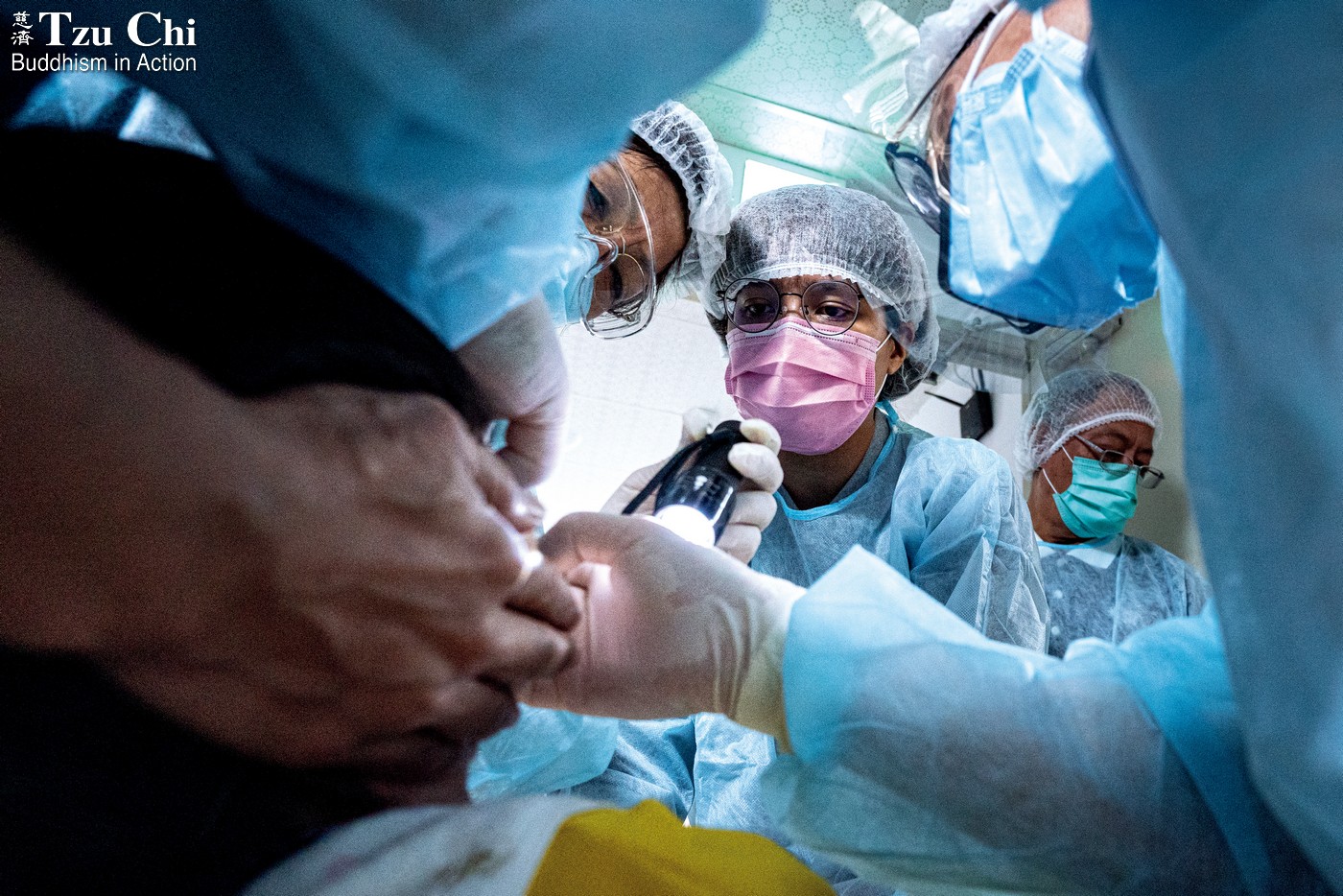
Dentists at a Tzu Chi free clinic for special needs patients carefully provide treatment, using flashlights and headlamps for illumination.
“Mom is here. The doctors will be done soon; don’t exert yourself. You’re going to become a handsome guy!” reassured Mrs. Chen, to her son Tai-you. Mrs. Chen and her husband make a weekly visit to a care facility run by the Genesis Social Welfare Foundation (GSWF) to see their son. This day’s visit, however, was a special one.
Seven years ago, Tai-you was in a motorcycle accident that left him in a vegetative state. Afterwards, his parents sought help from several dental clinics to help care for his teeth. Unfortunately, doctors always politely declined to treat him, due to his inability to respond and his dependence on a ventilator connected through a tracheostomy tube. But that changed in 2022 when he was transferred to the GSWF facility. Regular dental care there is provided by the Tzu Chi International Medical Association (TIMA). It wasn’t long before Tai-you’s dark and yellow teeth were clean and white again.
“Tai-you, blink your eyes twice to express your gratitude to the doctors,” Mr. Chen said to his son. November of last year marked the first time Tai-you had had a dental cleaning since the accident, and Mr. Chen had been eagerly looking forward to meeting the Tzu Chi team. Finally, on this day, his wish was fulfilled. “Seeing so many people serving Tai-you today is truly unexpected. I’m immensely grateful to have such an exceptional team care for my son!”
Dental calculus
On May 20 and 21, 2023, a total of 213 TIMA healthcare professionals and support volunteers from all over Taiwan provided dental care, as well as ENT and surgical treatment, to elderly people in need, patients in vegetative states, and individuals with physical and mental disabilities. The services were conducted at three institutions in Taitung, southeastern Taiwan: the Taitung Ren’ai Senior Citizens’ Home, the Genesis Social Welfare Foundation’s Taitung branch, and the Shenxiu Nursing Center (affiliated with the Malan Veterans Home). The free medical events over the two days served approximately 300 patient visits.
Dental patients with special needs require specialized clinical care. As an example, the entry of water into the airway during the dental cleaning procedure can cause respiratory obstruction and reduce blood oxygen levels, so extra attention and monitoring is required by a whole team. During TIMA’s free clinics, each patient is typically attended by two dentists who provide mutual support. They are assisted by two or three nurses or specially trained dental assistants, who are responsible for suctioning water from the patient’s mouth and passing instruments. At the foot of the bed, a nurse or doctor monitors the patient’s blood oxygen level using an oximeter. A volunteer with expertise in plumbing and electricity is also on standby to ensure the proper functioning of equipment. Furthermore, a doctor conducts regular rounds to promptly respond to emergencies. Everyone works together and implements multiple safeguards to ensure that treatments are carried out with the utmost safety.
TIMA’s dental services for people with special needs started in 2008. Dr. Li Yi-bang (李彝邦), the director of Special Needs Dentistry at Hualien Tzu Chi Hospital, eastern Taiwan, went to a dental university in Japan in 2007 to study home-based oral care. The following year, the Genesis Social Welfare Foundation’s Taichung branch in central Taiwan reached out to TIMA. They expressed concerns about the lack of dental care available to their residents in vegetative states. In response, TIMA members in central Taiwan organized the first-ever dental care event for such individuals. Dr. Li Yi-bang, along with over ten volunteers, provided dental cleaning and treatment for 30 patients in vegetative states.
“The first time I volunteered at a dental clinic for people in vegetative states was an emotional experience. It brought tears to my eyes,” Dr. Li recalled. “Witnessing the profound suffering these individuals endured, it felt as if their souls were confined within a prison.” He added that although these patients can’t express their dental pain, he recognizes the importance of TIMA’s assistance and the potential difference they could make.
Dr. Li continued, “It took more than an hour to thoroughly clean each person’s teeth. Their dental calculus was quite severe; sometimes it required multiple sessions to completely remove it. There were also many cases of tooth decay and periodontal disease.” He emphasized that tooth decay and periodontal disease can in turn pose risks for other diseases, such as aspiration pneumonia. The periodontal bacteria can enter the bloodstream, affecting the heart or causing brain infections or abscesses. It can also contribute to vascular inflammation and blockage, increasing the likelihood of stroke. It’s vital not to overlook the importance of proper oral care.
Before performing any procedure on an individual in a vegetative state, Dr. Li takes the time to explain what he is going to do. He also adds, “Dental cleaning may cause some discomfort. I apologize for any pain. Please bear with it for a moment.” He stressed the importance of experience when it comes to providing dental care to such patients. One important aspect is quickly suctioning dental calculus and cleaning water to prevent overflow from the oral cavity. Dr. Li typically pauses the cleaning process after silently counting to around ten or 20 while he cleans to ensure proper control. Another crucial consideration is the positioning of the bed, which should be inclined at an angle of about 40 to 60 degrees. Additionally, an extra pillow is placed behind the neck to create a bend in the airway. This ensures that the patient’s head is in the optimal position for treatment. If the head is in the wrong position, water can easily pass through the airway and enter the lungs.
When caring for patients in such conditions, dentists must adapt their posture, often bending and sometimes even stooping over the bed to accommodate them. The positions can eventually result in discomfort and stiffness in the neck and waist, requiring the use of back support during treatments. Nevertheless, despite these challenges, every dentist approaches their work with joy and enthusiasm. They volunteer for the free clinics repeatedly, even though it’s on their own time and at their own expense.
TIMA members have been visiting the Taichung branch of the Genesis Social Welfare Foundation every three months for 15 years, since 2008. Their services have expanded to include GSWF branches in Miaoli, Nantou, Hsinchu, Taipei, Keelung, New Taipei, and Taitung. When individuals in vegetative states experience toothaches or gum inflammation, they may drool constantly. After receiving a dental cleaning, their mouths are less likely to suffer from inflammation or unpleasant odors. The air inside the care facilities actually becomes fresher, without lingering smells. Furthermore, there is a reduction in oral bacteria, resulting in fewer hospitalizations for pneumonia among the residents, thereby alleviating the workload of healthcare workers.
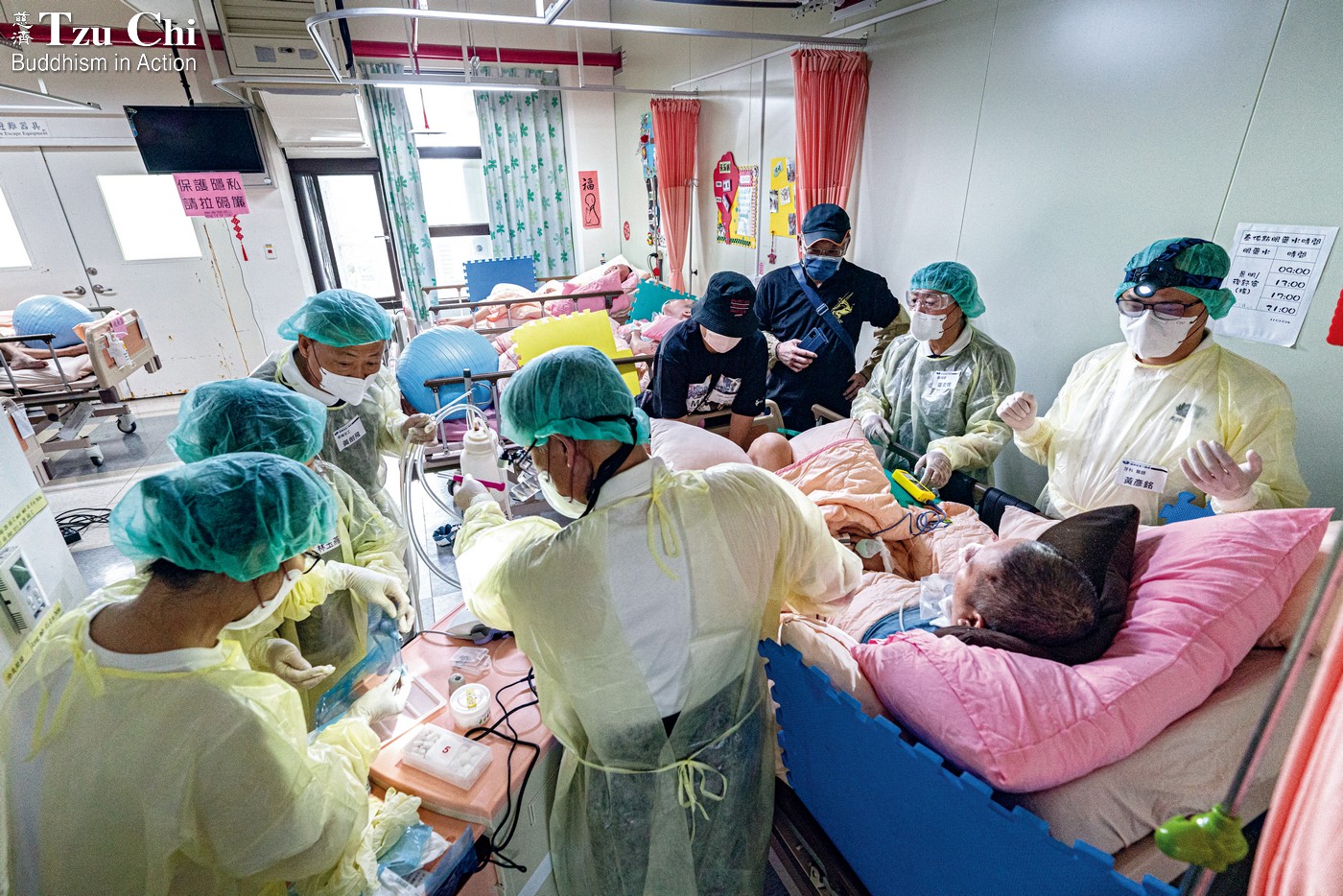
Mr. and Mrs. Chen (standing in the rear) observe as TIMA volunteers prepare to clean their son’s teeth.
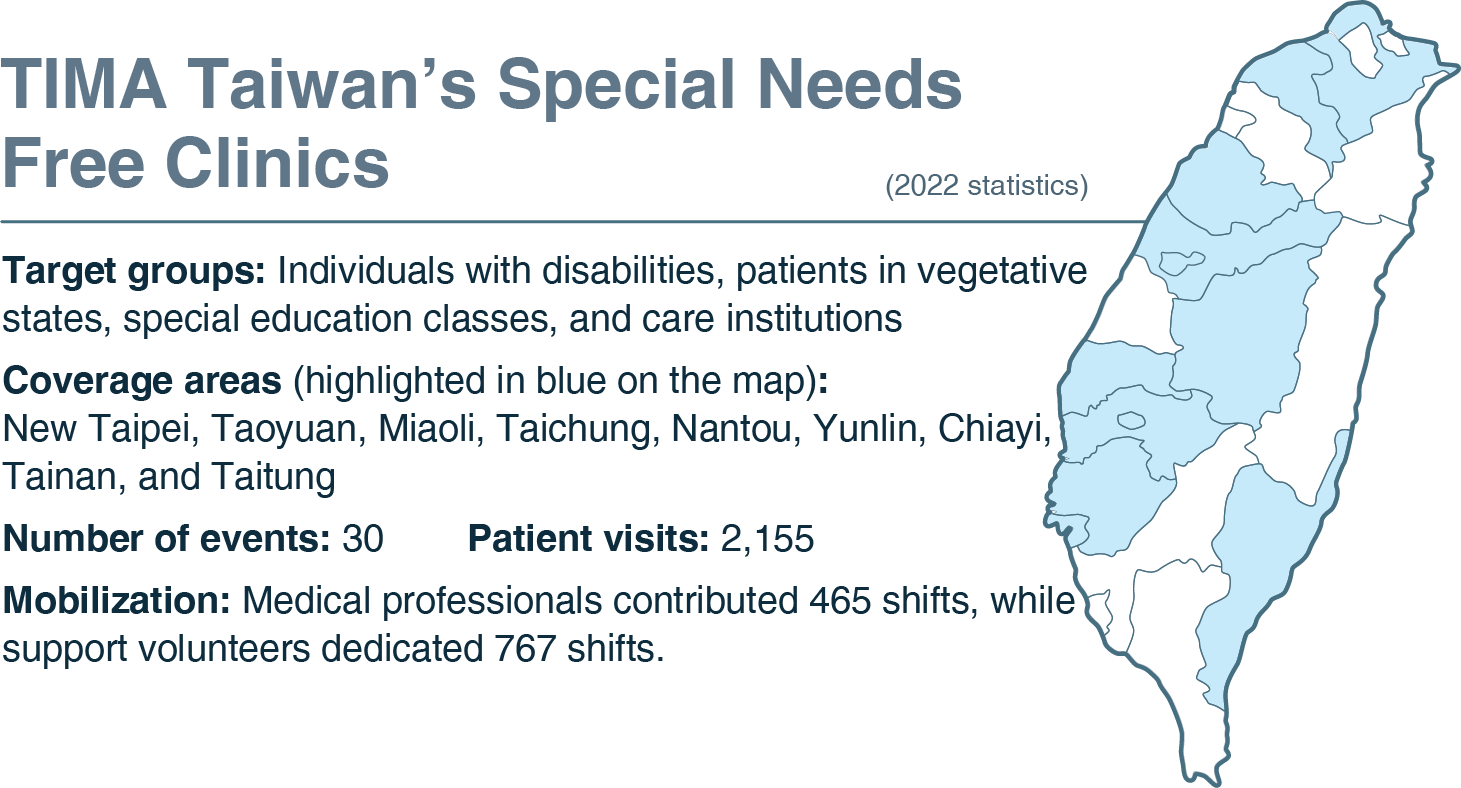
Dedicated volunteers
“It really hurts when my patients bite, but I understand that they don’t do it on purpose,” said dentist Huang Wen-guo (黃文國). “If I were in the same situation, I’d hope that healthcare professionals would make allowances for me.” One elderly lady at the Shenxiu Nursing Center, one of the three locations where TIMA offered free clinics in May in Taitung, kept shouting and refusing to receive treatment, firmly biting into Dr. Huang’s hand, unwilling to let go.
Huang works in the Department of Dentistry at Taipei Tzu Chi Hospital, northern Taiwan. He has devoted more than 20 years to delivering dental care to individuals with special needs. Half of his patients suffer from mental illnesses, followed by those with physical disabilities. Some individuals with special needs present particular challenges for dentists, even with the assistance of security personnel to restrain them, making it difficult to provide smooth dental treatment.
Dr. Huang shared an anecdote about a patient with bipolar disorder who spent over an hour rambling in his consultation room. An assistant gestured for him to stop, but the patient angrily brushed her hand away. Huang patiently listened and provided advice at appropriate moments. In the end, the patient expressed gratitude, saying, “Thank you for listening to me for such a long time. I no longer have the desire to kill that person.”
Another patient came to bid farewell, revealing that he had refrained from eating for seven days. He thanked Dr. Huang for the years of care that had relieved him of toothaches. Huang quickly informed a social worker of the patient’s situation while offering solace to the patient and presenting him with a gift given to him by Tzu Chi volunteers. To everyone’s surprise, the patient knelt down and repeatedly thanked Huang. Four days later, during a follow-up visit, the patient said to Huang, “My mood has improved.”
When he was growing up, Huang’s father had consistently advised him to take care of his family and extend help to others when he had the ability. He kept his father’s words firmly in mind and committed himself to assisting others with his medical expertise. But Huang acknowledged, “I’m no longer young. Before I reach a point where I can no longer work, I hope to see more younger individuals join this field to carry on the torch.” This was his greatest concern.
Patients with special needs pose challenges in providing treatment. Dentists who specialize in treating them often face lower incomes and higher medical risks. Consequently, new dentists in this area of expertise often become discouraged and quit within three months. Huang doesn’t mind the hard work but hopes for a continuous influx of young professionals in the field, whether in regular clinics or free clinics.
Li Zi-ying (李姿瑩) was a member of the Tzu Chi Collegiate Association (TCA) when she studied at Kaohsiung Medical University in southern Taiwan. When she graduated and entered dental training, she faced a dilemma in choosing which dental specialty to pursue. But then, a vivid scene suddenly flashed in her mind: during her fifth-year internship, she witnessed Dr. Huang Chun-de (黃純德), a pioneer in special needs dentistry in Taiwan, holding the hand of a disabled patient and singing to him. This scene reminded her of her own experiences accompanying patients as a volunteer for TCA. “I aspired to live a purposeful life, so I made the decision to choose pediatric and special needs dentistry,” she explained.
Li began participating in TIMA free clinics in 2017. The following year, she invited Huang Zi-min (黃子旻), a third-year dental student at her alma mater, to join as a dental assistant in TIMA’s free clinics in Taitung. Huang later graduated and became a dentist herself. She participated as a full dentist for the first time in TIMA’s free clinics in Taitung last year.
Li remembered the words of Dharma Master Cheng Yen, who had once told her, “Inviting young people to participate in our free clinics is not as difficult as it may seem.” Motivated by these words, Li gathered her courage and, together with Liao Guan-xuan (廖官瑄), a fellow dental alumnus, organized a training event for youth medical volunteers at their alma mater earlier this year. In addition to teaching courses on clinical skills and the delivery of oral health education, they invited the participants to serve at TIMA free clinics. Five attendees volunteered at the free clinics held in Taitung this time.
Li said that young people are pure and passionate, echoing the sentiments of renowned primatologist Dr. Jane Goodall, who stated that when a group of young people come together, they have the power to change the world. Li aspired to be a strong pillar of support for this transformative power.
Dr. Chen Qing-jia (陳清家), a resident of Taitung, had experience providing dental care to special needs patients in a nursing home for about four years before participating in a TIMA free clinic for the first time in November 2020. He was aware of the presence of HIV/AIDS patients in the facility where they were offering dental services, but remained fearless, stating, “As long as I take proper precautions, there is no need to fear. Everyone else [in our team] is doing it, and I should, too.”
Due to the pandemic, TIMA was forced to suspend its free medical services for two years. When Dr. Chen rejoined TIMA’s free clinics in November 2022, one of their target groups for services were individuals in vegetative states at the Taitung branch of GSWF. It was Chen’s first time offering services to such people, which naturally made him a bit nervous. Fortunately, Dr. Li Yi-bang shared many valuable clinical techniques with him. Being part of a dedicated medical team working together to care for those in need also brought Chen a sense of peace of mind.
While Chen was cleaning the teeth of a patient at the Taitung branch during the May free clinics this time, the individual suddenly started shedding tears, which startled him. He wasn’t sure if the patient was experiencing pain or if he was moved by the care and love demonstrated by the team. Everyone comforted the patient in a gentle manner, saying, “We are all here to help you.”
Chen’s wife, Wu Yan-chan (吳彥蟬), and their son, Chen Dao-yi (陳道宜), volunteered alongside him, serving as assistants. Wu expressed profound gratitude for the opportunity to volunteer together with her family. Their son is currently interning at a hospital. Chen hoped that Dao-yi would go beyond merely observing techniques and acquiring experience as an assistant at such events. He wished for him to embrace the spirit of Great Love and integrate it into his lifelong medical career.
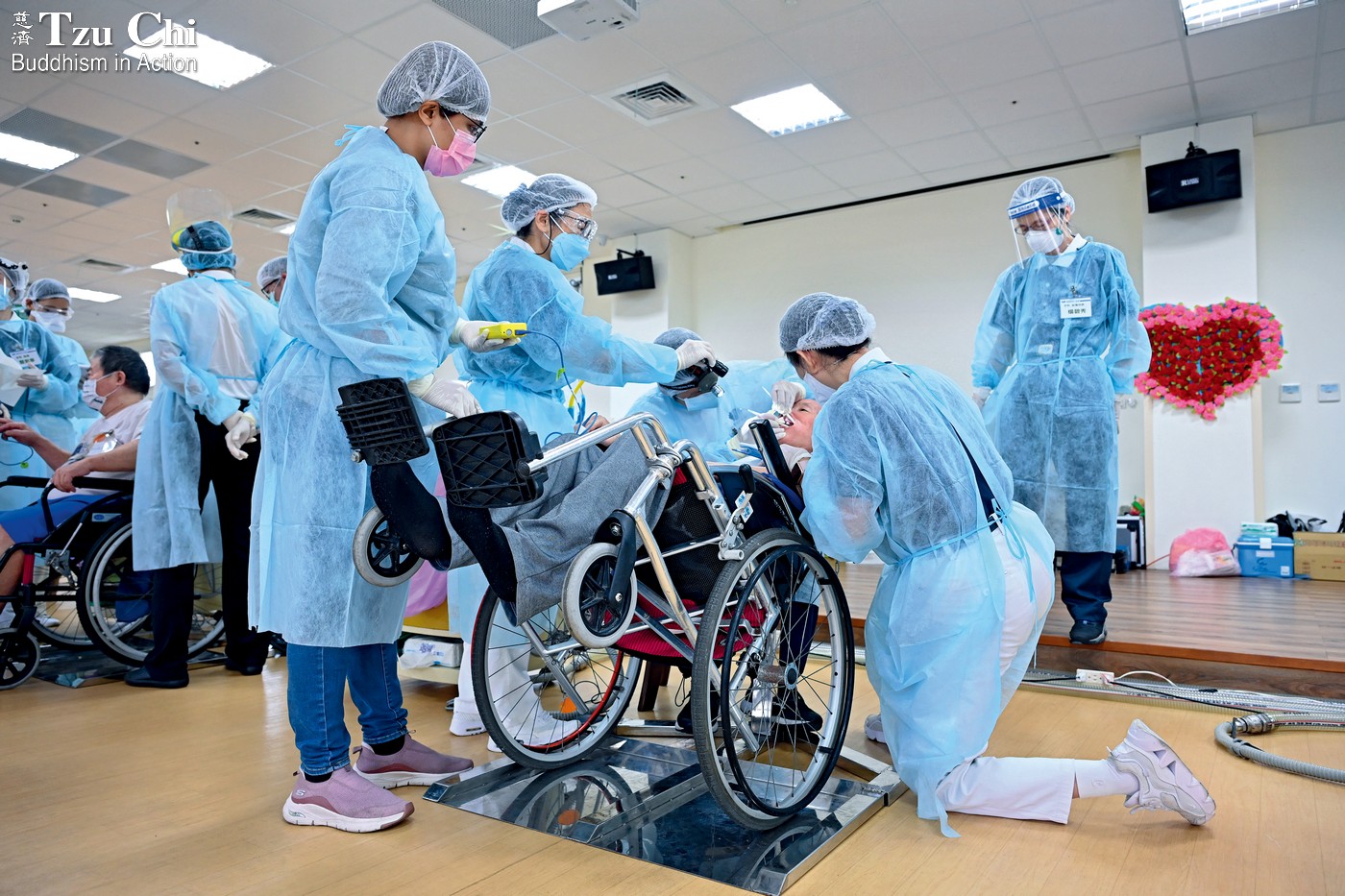
At a TIMA free clinic on May 20 at the Shenxiu Nursing Center, dental assistants stand or kneel, offering comforting words to patients or even holding their hands in an attempt to alleviate any fear they might have.
Lin Jia-ru
We’ll come back again
Wang Yu-feng (王玉鳳), the director of GSWF’s Taitung branch, recalled the initial visit of TIMA volunteers to her institution in 2016 for a free clinic. More than 40 medical workers and support volunteers came together for the event. Wang was so deeply moved that tears welled up in her eyes. “It was like witnessing a glimmer of hope.”
She explained that when the Taitung GSWF branch was established in 2014, she had struggled to find oral healthcare resources in the area for her residents. To her surprise, a team from all over Taiwan gathered to provide services to the residents of her institution, despite it being located in the remote area of Taitung. As that first event drew to a close, she grew concerned and asked, “Will there be another visit?” Several doctors, including Xie Jin-long (謝金龍) and Li Yi-bang, reassured her with determination, saying, “We will definitely return next time!”
TIMA holds special needs dental clinics in Taitung every May and November. However, during the COVID-19 pandemic, the clinics had to be temporarily suspended. Nevertheless, the medical team continued to demonstrate care and concern to the institution through messaging apps. On one occasion, after an earthquake struck Taitung, volunteers reached out to the institution and asked, “Was everyone okay after the severe earthquake in Taitung last night?” On other occasions they expressed sentiments such as, “We miss the director and the patients greatly and are also concerned about the patients’ oral health.” They eagerly awaited the resumption of the free clinics.
The free clinics resumed in November of last year as the pandemic eased. Director Wang said, “When I saw the volunteers returning, I couldn’t help but cry. They never forgot about us!”
Dr. Li Yi-bang enjoys singing to patients to help them find emotional relief. He remarked, “Simply singing to individuals in vegetative states can sometimes improve their blood oxygen levels!” Xiao-mai, a young man, suffered a brain injury from a car accident and had been bedridden at GSWF’s Taitung branch for six months before he miraculously regained consciousness. Dr. Li knew that Xiao-mai enjoyed listening to songs by Jay Chou (周杰倫), a renowned Taiwanese singer, so he dedicated time to practicing the song “Rainbow.” As Xiao-mai listened and smiled, Li encouraged him to work hard at rehabilitation, saying, “Once you can walk with crutches, I will take you to Taichung for some fun!”
“We had just a dozen people [volunteering] at the beginning, and now we have over 200 people! It truly feels like a miracle!” exclaimed Li Yi-bang. He further expressed that it is because he is in Tzu Chi that he has been able to connect with so many medical professionals and volunteers who share the same values and aspirations. He emphasized the immense satisfaction he derives from working with everyone else to deliver oral healthcare to a large number of individuals simultaneously. “I consider myself incredibly fortunate to be a part of the Tzu Chi family!” he concluded.
Volunteers set up pipelines before the start of a free clinic.
